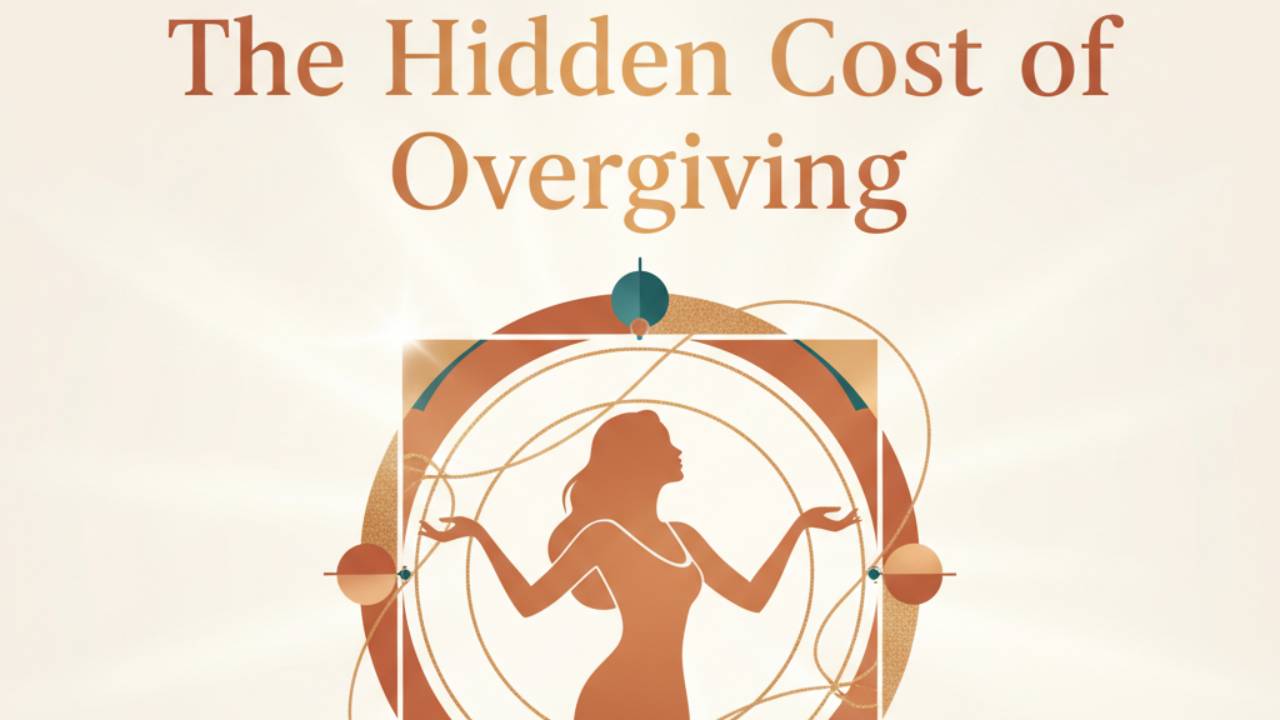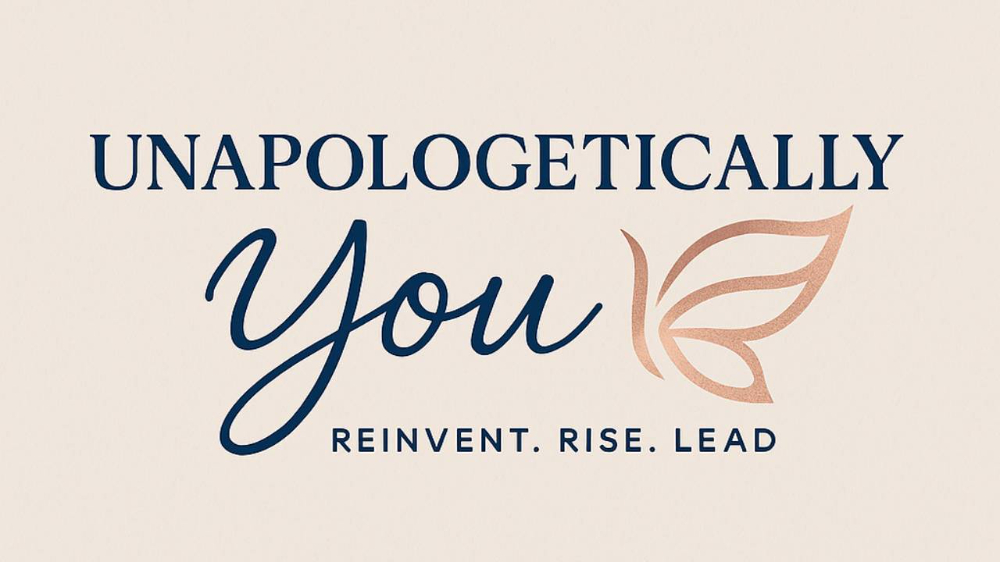
Episode 23: The Hidden Cost of Overgiving
Nov 25, 2025The Hidden Cost of Overgiving: When Your Generosity Quietly Drains Your Wealth
You're the one everyone can count on. The woman who over-delivers for clients, over-functions at work, over-sees everything at home, and overextends financially to keep the peace.
On the surface, it looks like generosity. You're praised for it. Rewarded for it. Known for it.
But underneath? It often hides a deeper belief:
If I keep giving, they'll stay. If I keep giving, I'll be safe. If I keep giving, I'll finally feel worthy.
If that hits a nerve, stay with me. We're not here to shame your heart. Your generosity is sacred. We're here to separate your worth from your output—so your giving can be powerful, clean, and sustainable instead of quietly draining your wealth.
Generosity vs. Overgiving: Drawing the Line
Let's be clear about the difference, because it matters.
Generosity says: I choose to give from overflow. This feels aligned, and I could say no.
Overgiving says: I can't not give, even when it hurts me.
Generosity feels grounded, thoughtful, energizing.
Overgiving feels leaky, resentful, depleting.
What Overgiving Actually Looks Like
-
Adding extra work or sessions "just this once"—and never charging for it
-
Discounting your rates because you feel guilty asking for what your work is worth
-
Being the one who always pays, always organizes, always figures it out
-
Giving away your best ideas and frameworks for free, over and over, hoping it will turn into something
And here's the important piece: Women are not imagining the cost of this.
Workplace research consistently shows women carry more emotional labor—managing other people's feelings, smoothing tensions, staying pleasant—and that this load is strongly linked to exhaustion and burnout at the leadership level.
Big studies like McKinsey's Women in the Workplace Report and global burnout surveys show women leaders report higher levels of stress and burnout than men in similar roles.
So when you feel like you're doing more for the same recognition or pay and you're tired down to your bones? You're not being dramatic. You're describing a documented pattern.
The Hidden Math of Overgiving
I call this the Over-Giver Wealth Equation:
High output + Fuzzy boundaries + Unpriced emotional and strategic labor = Emotional + Financial deficit
On paper, you might be hitting revenue targets, delivering incredible value, getting praised as the one everyone can count on.
But internally? The numbers don't add up.
-
You're tired all the time
-
You feel underappreciated
-
Your bank account doesn't match your level of effort
Over time, overgiving erodes three currencies at once:
1. Time
You're giving hours you'll never get back—often unpaid.
2. Energy
You're holding emotional weight that no one else sees.
3. Self-Respect
Because a part of you knows you are crossing your own boundaries.
And that last one? That's the most expensive.
When you repeatedly override your own needs for everyone else, your nervous system stops trusting you to protect it. So even when more money comes in, your body does not relax—because it expects you to give it away.
Where Overgiving Really Starts
If you grew up being the responsible one, the achiever, the fixer, the peacemaker, overgiving didn't start with money. It started with survival patterns like:
-
Emotionally supporting adults when you were still the kid
-
Performing to earn praise, love, or safety
-
Shrinking your needs so you didn't cause problems
Then you grew up, became wildly capable, and that survival pattern came with you.
Now you're the woman who over-delivers for clients, over-functions at work, over-sees everything at home, overextends financially to keep the peace.
Psychologists talk about this as chronic emotional labor—and long-term, it's linked to stress, health issues, and burnout.
So when you say, "I'm so tired of being the strong one for everyone," that's not weakness. That's your body finally telling the truth.
You are not broken. You are brilliant at surviving. Now we get to make your generosity sustainable.
Clean Generosity vs. Survival Strategy
Let me be really clear here: The answer is not to stop giving.
In fact, there are MRI studies showing that generosity is actually good for us when it comes from a clean place. People who commit to giving to others light up the brain's reward and happiness centers more than people who only spend on themselves.
Generosity itself is not the enemy.
The problem is when you use giving as a way to buy safety, approval, belonging, or proof that you are a good person. That's no longer generosity. That's a survival strategy.
Clean generosity says: I choose this. I could say no and I'd still be worthy.
Overgiving says: If I stop, something bad will happen.
We are here to build the first one.
The Three-Question Test (Before You Give)
Here's a simple test you can use before you give your time, energy, or money:
Question 1: If I say yes, will I silently resent it later?
If your honest answer is yes, that's not generosity—that's self-abandonment in a nice outfit.
Question 2: If I knew this person would still love, respect, or value me if I said no, would I still want to give this?
If your desire disappears when the pressure is removed, the giving was never about love. It was about fear.
Question 3: Am I giving from overflow or from depletion?
Check in with your body:
-
Overflow giving feels like openness and warmth
-
Depletion giving feels like heaviness and obligation
Current data on burnout tells us this isn't just a mindset issue. In several large surveys, roughly half of employees and over half of leaders reported burnout in the past year. Women are consistently more impacted.
So when you choose to protect your capacity, you are not being dramatic. You are intervening in a pattern that wrecks health and careers.
Boundaries Are Containers, Not Walls
I want you to try on a different frame:
Your boundaries are not walls. They are containers that let your generosity last.
When you say:
-
"This is my rate, this is what's included"
-
"This is what I can contribute now"
-
"This is my availability"
You are not being selfish. You are protecting your ability to keep caring, keep leading, and keep giving over the long term.
What Wealth Boundaries Sound Like
-
"I'd love to support you, and here's what I can realistically offer."
-
"I don't discount this service, but I can point you toward a resource that fits your budget."
-
"I am not resourced for this conversation right now. Can we schedule a time when I can be fully present?"
It may feel edgy at first. You might feel guilty, shaky, or worried they'll be upset.
That's not a sign you're wrong. That's just your nervous system meeting a new behavior it's never seen you do before.
Your Reflection This Week
Where are you overgiving right now? And what are you secretly hoping to receive in return?
Approval? Security? Love? A sense that you're good enough?
Be honest with compassion. You're not in trouble. You're just gathering intelligence on your own patterns.
Then choose one area to experiment with clean generosity:
-
Hold your rate for the next client
-
Offer less, but more intentional support instead of everything
-
Say "I'll get back to you" instead of a reflexive yes
-
Give a smaller aligned financial gift that doesn't put you into stress
You're teaching your system: We can give and also protect ourselves.
That shift alone changes your wealth over time.
The Bottom Line
Your heart was never the issue. Your capacity is.
When you untangle your worth from your output, your giving becomes more powerful, not less—because it's rooted in self-respect instead of self-erasure.
If today's message is calling you out and calling you forward, this is exactly the kind of work we do inside the 5-Day Wealth Activation.
We look at your wealth patterns through the lens of nervous system, identity, and behavior—so you can build money, generosity, and leadership that don't require you to disappear.
Start the 5-Day Wealth Activation today →
Lead with ease. Earn in alignment. And let your generosity start including you.
Listen to the Full Episode
🎧 Listen to Episode 23: The Hidden Cost of Overgiving on Unapologetically In Power
About the Author
Jennifer Damaskos is a leadership coach and real estate investor who helps high-performing women build wealth from self-trust instead of self-sacrifice. Through her brand Unapologetically In Power, she blends neuroscience, identity work, and strategic frameworks to create lasting transformation—not just temporary motivation.
Connect with Jennifer:🌐 jennifer-damaskos.mykajabi.com📸 Instagram: @unapologeticallyinpower🎙️ Podcast: Unapologetically In Power
You’re not just here to listen. You’re here to rise.
This is your space to reconnect with the woman beneath the roles.
These companion notes aren’t fluff. They’re the fuel and the framework behind each episode—crafted to help you integrate the real talk, power prompts, and shifts you’re craving.
Because growth isn't a hack. It's a homecoming.

